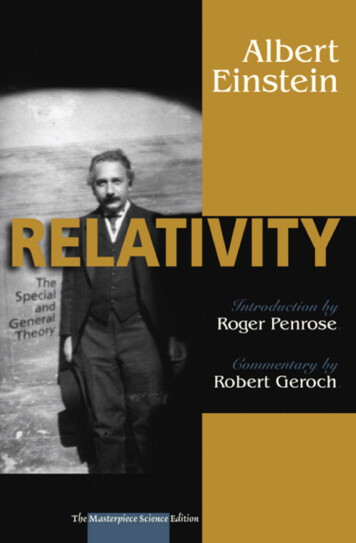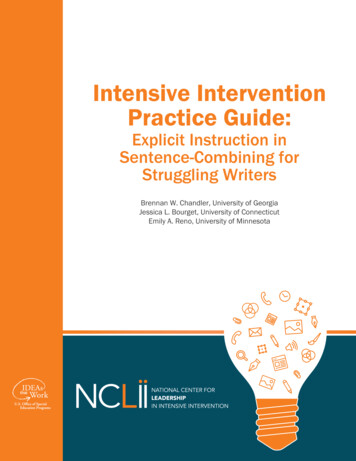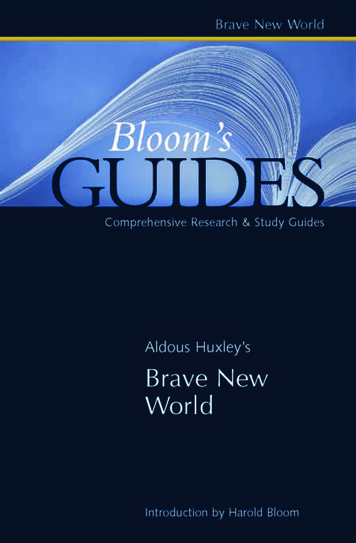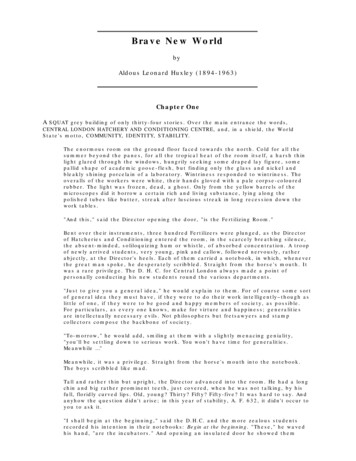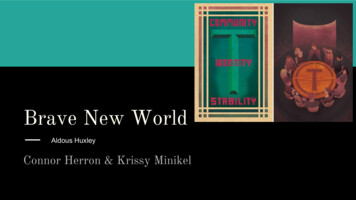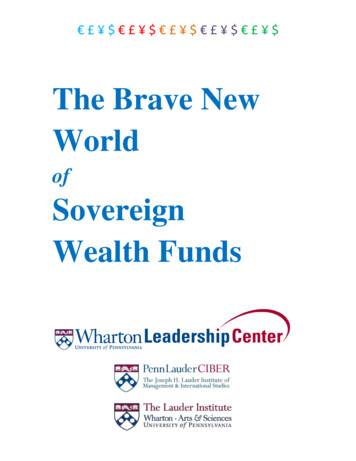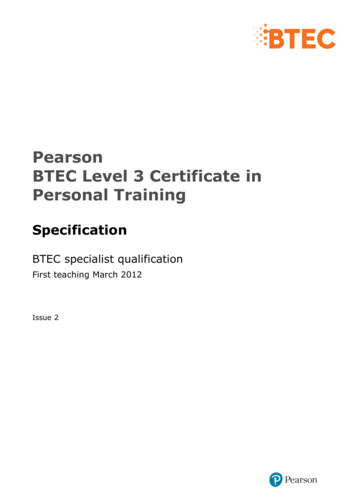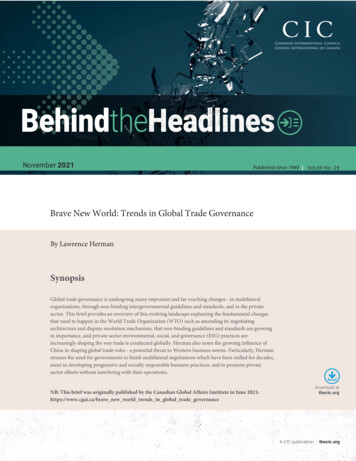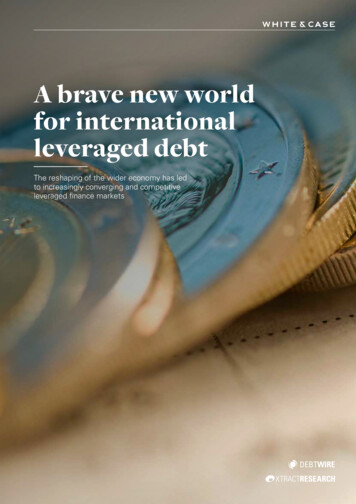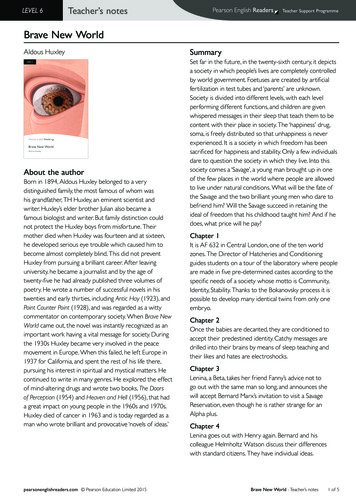
Transcription
level 6Teacher’s notesTeacher Support ProgrammeBrave New WorldAldous HuxleyAbout the authorBorn in 1894, Aldous Huxley belonged to a verydistinguished family, the most famous of whom washis grandfather, TH Huxley, an eminent scientist andwriter. Huxley’s elder brother Julian also became afamous biologist and writer. But family distinction couldnot protect the Huxley boys from misfortune. Theirmother died when Huxley was fourteen and at sixteen,he developed serious eye trouble which caused him tobecome almost completely blind. This did not preventHuxley from pursuing a brilliant career. After leavinguniversity, he became a journalist and by the age oftwenty-five he had already published three volumes ofpoetry. He wrote a number of successful novels in histwenties and early thirties, including Antic Hay (1923), andPoint Counter Point (1928), and was regarded as a wittycommentator on contemporary society. When Brave NewWorld came out, the novel was instantly recognized as animportant work having a vital message for society. Duringthe 1930s Huxley became very involved in the peacemovement in Europe. When this failed, he left Europe in1937 for California, and spent the rest of his life there,pursuing his interest in spiritual and mystical matters. Hecontinued to write in many genres. He explored the effectof mind-altering drugs and wrote two books, The Doorsof Perception (1954) and Heaven and Hell (1956), that hada great impact on young people in the 1960s and 1970s.Huxley died of cancer in 1963 and is today regarded as aman who wrote brilliant and provocative ‘novels of ideas.’SummarySet far in the future, in the twenty-sixth century, it depictsa society in which people’s lives are completely controlledby world government. Foetuses are created by artificialfertilization in test tubes and ‘parents’ are unknown.Society is divided into different levels, with each levelperforming different functions, and children are givenwhispered messages in their sleep that teach them to becontent with their place in society. The ‘happiness’ drug,soma, is freely distributed so that unhappiness is neverexperienced. It is a society in which freedom has beensacrificed for happiness and stability. Only a few individualsdare to question the society in which they live. Into thissociety comes a ‘Savage’, a young man brought up in oneof the few places in the world where people are allowedto live under natural conditions. What will be the fate ofthe Savage and the two brilliant young men who dare tobefriend him? Will the Savage succeed in retaining theideal of freedom that his childhood taught him? And if hedoes, what price will he pay?Chapter 1It is AF 632 in Central London, one of the ten worldzones. The Director of Hatcheries and Conditioningguides students on a tour of the laboratory where peopleare made in five pre-determined castes according to thespecific needs of a society whose motto is Community,Identity, Stability. Thanks to the Bokanovsky process it ispossible to develop many identical twins from only oneembryo.Chapter 2Once the babies are decanted, they are conditioned toaccept their predestined identity. Catchy messages aredrilled into their brains by means of sleep teaching andtheir likes and hates are electroshocks.Chapter 3Lenina, a Beta, takes her friend Fanny’s advice not togo out with the same man so long, and announces shewill accept Bernard Marx’s invitation to visit a SavageReservation, even though he is rather strange for anAlpha plus.Chapter 4Lenina goes out with Henry again. Bernard and hiscolleague Helmholtz Watson discuss their differenceswith standard citizens. They have individual ideas.pearsonenglishreaders.com Pearson Education Limited 2015Brave New World - Teacher’s notes 1 of 5
level 6Teacher’s notesTeacher Support ProgrammeBrave New WorldChapter 5Chapter 13Lenina and Henry pass the Slough Crematorium, wherephosphorus is recovered so that people are socially usefuleven after death. Bernard attends a Unity Service: twelvemen and women become one after communing soma andpraising the Greater Being. It ends in an orgy.Linda dies while there is a round of children beingdeath-conditioned in the hospital.Chapter 6Bernard shares with Lenina his desire to be himself, andfeel passion. This horrifies and puzzles her. The DHCsigns the permit to go to the New Mexican Reservation.He tells Bernard the story of his visit long ago but laterregrets it.Chapter 7Without her soma, Lenina can hardly bear to watchthe dance. They meet John, the Savage, born to Linda, aformer civilized citizen, who found it hard to reconcile herconditioning with life in the Reservation.Chapter 8Linda retells the horrors of her life there: she became amother, she was beaten by the local women and she hadno soma. She discovers mescal to ease her pain and hasPope to comfort her. John was brought up among Linda’sstories from the Other Place, the works of Shakespeareand the local culture. Bernard offers to take him toLondon and gets permission to do so.Chapter 9The DHC is considering exemplary punishment forBernard when he marches in, followed by John and Linda.On hearing John call him father, he resigns, ashamed.Chapter 10Chapter 14Blaming soma for his mother’s death, John throws awaythe soma being distributed freely in the hospital. Thepolice come and gas soma over the crowd. John is takenprisoner.Chapter 15Mond explains to John that art and history are forbiddenfor the sake of happiness and stability, and how he gave upscience to become a controller.Chapter 16Mond explains there is no need for God where there iscomfort. John argues for suffering and poetry and God,although they make you sad.Chapter 17John retreats to a lighthouse to be alone. He is stalked bythe media. He kills himself.The original textFirst published in 1932, the book was instantly recognizedas an important novel that warned the reader about thedangers of science when it is misused. This prophetic bookremains, in the twenty-first century, astonishingly relevantto our times.Background and themesFrom time to time a book appears that has somethingvital to say to society. Brave New World is such a novel.Everybody is curious about the new creature so Bernardbecomes very popular. Linda goes on a soma holiday,which John feels is not right. After the cinema, Leninaexpects an intimate encounter but John leaves her at herdoor.As a teenager, Huxley’s first love was science; his nearblindness prevented him from pursuing science as a career,but his interest remained, and it is Huxley’s understandingof the directions in which science is likely to lead theworld that forms the basis of the novel.Chapter 11Brave New World is a vision of a future in which a worldgovernment is able, through scientific methods, to totallycontrol people’s lives, from the moment of conceptionto the moment of death. Three main scientific methodsare used: genetic engineering – the genes of a foetus arescientifically manipulated to produce a specific kind ofhuman being, fit to work at a certain level of society;conditioning – young children are given powerful messagesthat teach them to think and feel in certain ways, and theuse of soma to induce ‘happiness’.John refuses to meet some guests, who blame Bernard.John introduces Shakespeare to Helmholtz, who is thrilledat his skill as a writer.Chapter 12On Fanny’s advice, Lenina visits John. He declares his lovefor her but when she undresses, he withdraws at suchimmorality. He gets a call from the hospital about Linda’scondition.pearsonenglishreaders.com Pearson Education Limited 2015Brave New World - Teacher’s notes 2 of 5
level 6Teacher’s notesTeacher Support ProgrammeBrave New WorldIn the novel, the World Controller for Europe, MustaphaMond, explains that these methods of control are usedfor the good of society, in order to ensure happiness andstability. And it is true that society in this ‘brave new world’is both happy and stable. Huxley does not make thenaive mistake of idealizing a life that is not controlled byscience. The Savage, who was brought up on an AmericanIndian reservation, lived a life that was in many waysuncomfortable and unpleasant. But – and Huxley makesthe point powerfully – the Savage has free will, somethingthat is denied to the inhabitants of the brave new world.Thus, the author brilliantly poses the reader with aprofound question. Is free will – the freedom to choose– worth the suffering that must go hand in hand with it?This is the question that his novel explores.After readingDiscussion activities74Chapters 4–6Before reading5Pair work: Ask students in pairs to think of an ideallife. Where would it be? What would they be allowedto do? What would they have to do? Would theyhave any limitations? Then have a class discussion tosee if there are ideas in common.6Group work: Write the first paragraph of the book(see below) on the board. Put students in pairs. Tellthem that the title of the book is Brave New Worldand that the first paragraph of the story is on theboard. Ask students, using this information, to write ashort paragraph about what the book could be about,using dictionaries where necessary. Then ask pairs toread their paragraphs aloud. As a whole, the classthen has to reach an agreement as to what the bookis about, finishing with a paragraph written up on theboard.A low grey building, of only 34 floors. Over themain entrance the words CENTRAL LONDONHATCHING AND CONDITIONING CENTRE,and below that the motto of the World State,COMMUNITY, IDENTITY, STABILITY.While reading3Group work: Put students into small groups. Askthem to write down what they think are the threedefining characteristics of the future described inBrave New World. Then elicit these characteristicsfrom students and write them up on the board untilthere is general agreement that the class hasdescribed the important ones.pearsonenglishreaders.com Pearson Education Limited 2015Pair work: Put students into pairs and ask them todiscuss the following questions:(a) Describe the differences between Lenina andBernard.(b) What is your opinion of Bernard so far? Thenhave a class discussion.Role play: (page 33) Lenina wants to visit the NewMexico Reservation, but has mixed feelings aboutBernard. She thinks he is odd and that she shouldnot risk a trip with him. Ask students to act out aconversation in which Lenina shares her doubts withFanny.After reading8Chapters 1–3Before reading2Discuss: Ask students whether the story so far hasany similarities to their ideal worlds discussed beforethey started to read the book.While readingBefore reading1Discuss: Ask students to discuss the following:Do you think that methods such as sleep conditioningand conditioning (e.g. pairing electric shocks with flowers)are effective? Give reasons for your opinion.Group work: Lenina and Bernard fly over Malpaisand can have a view of the Reservation. The guidewho is taking them refers to the place and the peopleusing very negative images. There is also the reportthey can read and the Director’s description of hisown trip. Ask students in small groups to offer a morepositive description of the place from the point ofview of the local people. Warn them they cannottwist the facts, only make them appear in a morepositive light.Chapters 7–9Before reading9Guess: Ask students to guess what they think is likelyto happen in the next chapters. Then write downtheir predictions on the board.While reading10 Discuss: (page 37) Bernard says ‘we are infantswhere feelings and desire are concerned.’ Askstudents in small groups to discuss how the socialorder in Brave New World contributes to this.11 Pair work: (after page 45) Put students into pairs.Ask them to discuss the following question:In his descriptions of Indian life on the New MexicanReservation, what do you think Huxley is trying to tellthe reader about the local lifestyle?Brave New World - Teacher’s notes 3 of 5
level 6Teacher’s notesTeacher Support ProgrammeBrave New World12 Role play: (page 51) Ask students to imagine they areLinda.You have just come to the Reservation anddescribe to a local woman why you came to live inthe Reservation and how you feel about your lifethere. Ask them to act out the conversation.After reading13 Role play: Divide students into pairs. Student A isa worker in the Fertilizing room who witnesses thescene between the Director, Bernard and Linda.Student B is a reporter. Have Student B ask Student Aquestions and have Student A answer them. Askstudents to practise the interview and select a few toshare their role play with the rest of the class.Chapters 10–13Before reading14 Discuss: Ask students to discuss what should bedone to the Director, now that it is clear John is hisson. Does he deserve punishment? Which? Must heleave his job? Why/why not?While reading15 Pair work: (after Chapter 10) Put students into pairs.Ask them to prepare a brief presentation in whichthey:(a) Describe the Savage from the point of view of atypical Alpha.(b) Describe London society from the point of viewof the Savage.Then they share their ideas with the class.16 Group work: (after Chapter 12) Ask students insmall groups to discuss these questions:(a) Who is your sympathy with in this chapter? Explainwhy.(b) What do you think the telephone conversation isabout?Have a whole class discussion with the ideasgenerated in the small groups.After reading17 Discuss: Ask students to discuss the following:Are Linda and John better off in the civilized worldthan they were in the Reservation? Why/why not?Use examples to support your arguments.Chapters 14–17Before reading18 Guess: Ask students to guess what is going to happento the Savage in the next four chapters. Why dothey think these things will happen? Include someexamples from the book.pearsonenglishreaders.com Pearson Education Limited 2015While reading19 Discuss: (page 95) Mustapha Mond says: ‘We believein happiness and stability.’ What are his arguments infavour of these things? How does he say they areachieved? Do you agree with him? Encourage studentsto give reasons for their opinions.20 Pair work: Ask students in pairs to imagine that theycould have a conversation with Mustapha Mond. Theywrite down what they would say to him. Havestudents practise having the conversation and select afew pairs to share their conversation with the rest ofthe class.After reading21 Pair work: Put students into pairs. Ask students toimagine that the Savage comes back to life. Student Aplays the Savage.Student B plays his questioner. Student B, as hisquestioner, asks him to explain why he killed himselfand tries to get him to see that it was not necessary.Extra activities22 Debate: Organize a debate, in which the class isdivided in half. Half the class must support thefollowing statement:‘Happiness and stability in society are more importantthan freedom.’The other half must support this statement:‘An individual’s freedom is more important thanhis/her happiness and the stability of society as awhole.’Divide each half into smaller groups and ask thegroups to prepare their arguments. Then have thedebate. First a student from one side speaks and thenthe other. At the end of the debate, take a vote onthe two positions.23 Pair work: Ask students in pairs to select theirfavourite quote from the text. Then they share it withthe rest of the class. Encourage them to account fortheir choice and to place it in the context of the storyso that it is clear to the rest.You can ask them towrite it on a poster and find a suitable picture to gowith it. After the activity, the poster can be displayedin the classroom.24 Group work: Few of Huxley’s predictions haveproved to be perfectly accurate, yet many aspects ofthe Utopia of Brave New World remind us of ourworld. Ask students in groups to discuss the followingquestions:The novel was published in the 1930s. Can it beconsidered as a prophetic vision of the future? How so?Which aspects of the book did you find most disturbing?Which strike you as most familiar? Which seem the mostfar-fetched?Brave New World - Teacher’s notes 4 of 5
level 6Teacher’s notesTeacher Support ProgrammeBrave New World25 Group work: Explain to students that themes are thefundamental and often universal ideas explored in aliterary work. Elicit from them what themes they canfind in the novel. If this proves too difficult, writethese on the blackboard.The use of technology to control societyThe consumer societyThe conflict between happiness and truthThe dangers of an all-powerful StateThe conflict between community and freedomThe role of scienceDivide the class into groups and assign one theme toeach group. Ask students to discuss how they aredealt with in the novel.pearsonenglishreaders.com Pearson Education Limited 201526 Discuss: Tell students that the Greek word utopiameans ‘an ideal place’. Its opposite, dystopia, is anegative utopia or anti-utopia. Ask students to explainwhy Brave New World is considered a novel in thatgenre.Brave New World - Teacher’s notes 5 of 5
Brave New World pearsonenglishreaders.com Pearson Education Limited 2015 Brave New World - Teacher’s notes 3 of 5 LEEL Teachers notes Teacher Support Programme In the novel, the World Controller for Europe, Mustapha Mond, explains that these methods of control are used for the good of society, in order to ensure happiness and stability.File Size: 2MB
